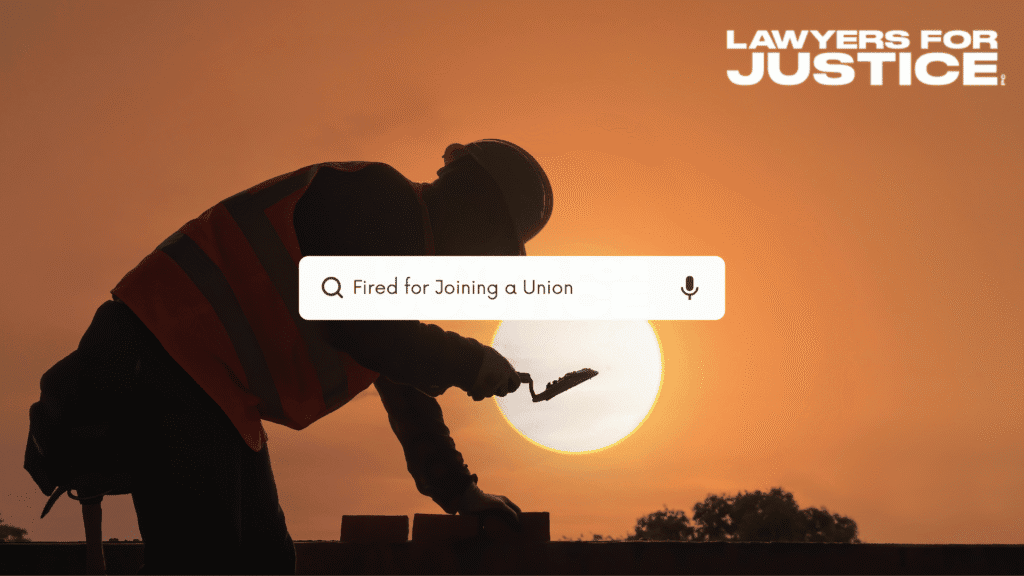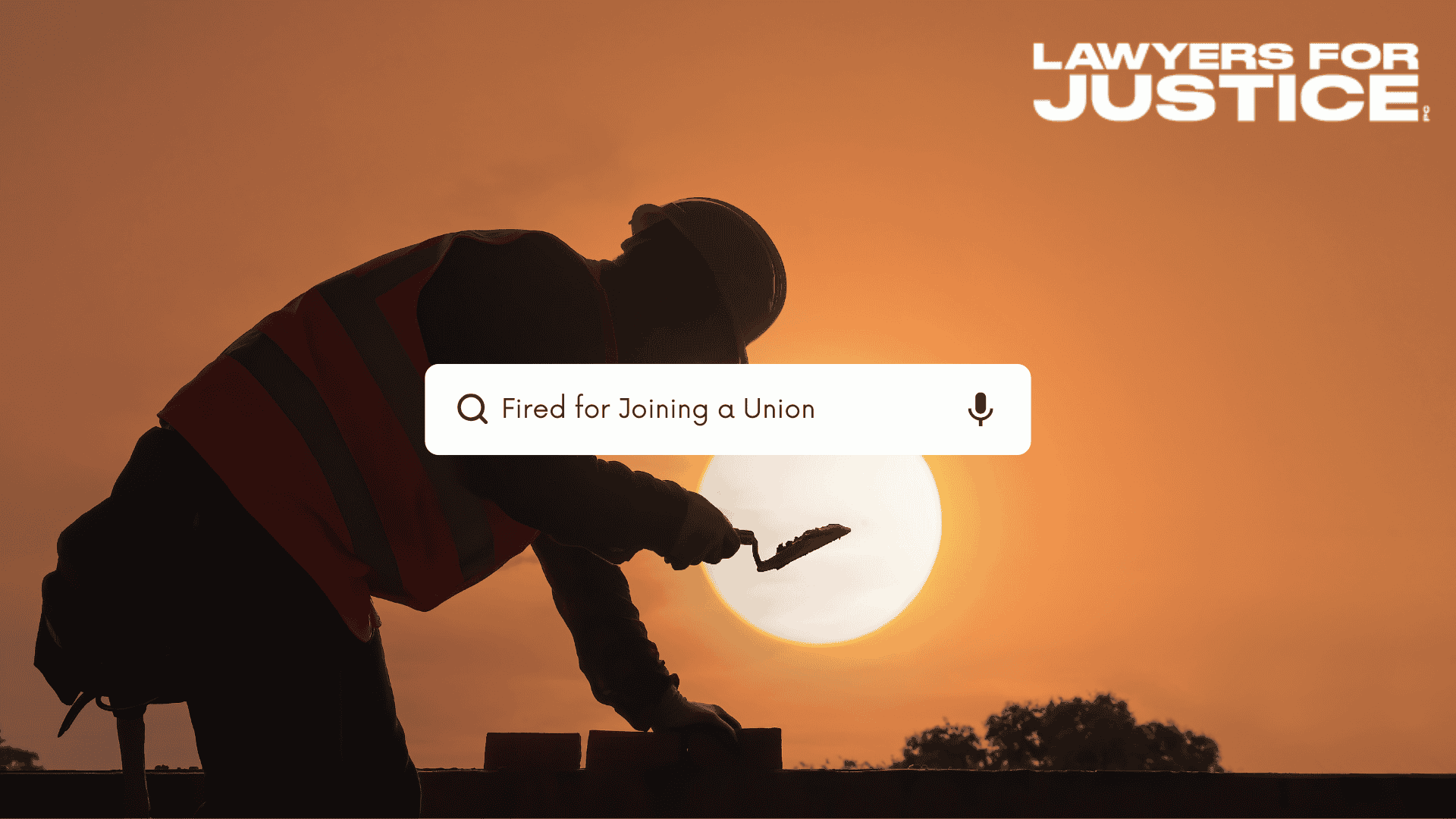Attorney advertisement by Edwin Aiwazian of Lawyers for Justice, P.C., headquartered at 450 N Brand Blvd, Glendale, CA 91203
California’s blue-collar workforce is the backbone of industries such as manufacturing, construction, transportation, and warehousing. Many workers turn to labor unions to advocate for better wages, safer working conditions, and greater job security.
But can an employer fire an employee for joining a union?

What Do Unions Do?
A union is an organized group of workers who come together to advocate for better wages, benefits, and working conditions. Unions negotiate with employers on behalf of workers through a process called collective bargaining, making sure employees have a voice in crucial workplace decisions.
Unions can also help employees address unfair workplace practices and treatment. Unions provide valuable support and resources for navigating legally complex situations like wrongful termination, wage theft, discrimination, harassment, unsafe working conditions, retaliation for whistleblowing, and violations of labor laws.
Why are Unions Controversial?
Unions are heavily controversial because they can create an adversarial relationship with management and can potentially disrupt business operations.
If negotiations between unions and management fail, unions may organize strikes which can impact an industry’s labor cost, hiring practices, and even consumer prices. In order to avoid strikes, companies could try to implement or enforce policies and measures to discourage union activity.
Can an Employer Fire Employees for Joining a Union?
It is illegal for employers to fire employees for joining or organizing a union. In California, it’s explicitly prohibited under California Labor Code Section 923, which protects employees’ rights to organize, form, join, or assist labor organizations and engage in collective bargaining without employer interference or retaliation.
Employers may attempt to discourage union activity through intimidation, retaliation, or other subtle/covert tactics.
Employers may reduce work hours/pay, become more critical of job performance, or try to create a hostile work environment to persuade employees to either not join a union or leave their job altogether.
If an employer takes actions that could be considered retaliatory due to an employee’s union involvement, they may be in violation of workplace rights.
Federal and State Protections for Union Activity
Workers in California are protected by both federal and state laws when it comes to unionization. The National Labor Relations Act (NLRA) safeguards employees’ rights to organize, engage in collective bargaining, and take collective action, such as strikes. They make sure workers have the freedom to advocate for themselves in the workplace.
In addition to federal protections, California has specific laws that reinforce workers’ rights to unionize and protect them from retaliation. California Labor Code Sections 923, 98.6, and 6310 prohibit employers from firing or retaliating against employees for unionizing or raising concerns about workplace hazards. These laws are especially crucial in blue-collar industries, where workplace safety and fair labor practices are key concerns.
California Labor Code Section 923 – Right to Unionize and Collective Bargaining
This law protects employees’ rights to form, join, or assist labor organizations and participate in collective bargaining. It also prohibits employer interference, restraint, or coercion when workers attempt to unionize.
California Labor Code Section 98.6 – Protection Against Retaliation
Employers are prohibited from retaliating against employees for exercising their labor rights, including filing wage claims, reporting labor violations, or engaging in union activities. This law ensures workers cannot be fired, demoted, or disciplined for asserting their legal rights.
California Labor Code Section 6310 – Protection for Reporting Workplace Hazards
Employees are protected from workplace retaliation when they report unsafe working conditions, workplace hazards, or violations of occupational safety and health laws. This law ensures that workers, particularly in high-risk industries, can raise safety concerns without fear of termination or other retaliatory actions.
These protections are vital in ensuring that workers can advocate for fair treatment, safe workplaces, and better working conditions without facing negative consequences.
What to Do If Workers Face Retaliation for Union Activity
Document Everything
Maintain records of any critical evidence that may support a claim, including written threats, warnings, or statements made by the employer. Document emails, text messages, written notices related to union activity, and any changes in job duties, schedules, or performance evaluations following union involvement.
Speak with a Union Representative or Worker Advocate
If an employee is part of a union, they should contact their union representative immediately. Unions have procedures in place to address retaliation and can provide guidance, support, and legal resources to help protect workers’ rights. Even for non-unionized workers, advocacy groups and labor rights organizations can offer assistance.
Seek Legal Representation from Lawyers for Justice, P.C.
Legal action may be the most effective way to hold an employer accountable and recover compensation. Lawyers for Justice, P.C., advocates for workers’ rights and ensures that employees facing retaliation receive the strongest legal support available. Lawyers for Justice, P.C. handles the entire legal process; the employment lawyers fight to secure lost wages and can recover other forms of compensation.
Employees do not have to face employer retaliation alone—Lawyers for Justice, P.C. protects workers to make sure their rights are upheld.
Lawyers for Justice, P.C. Is Here to Help
Joining a union is a legally protected right in California, and employers are prohibited from firing or retaliating against employees for union activity. It is essential for blue-collar workers to understand their rights, particularly when considering unionization to secure fair treatment, better wages, and safer working conditions.
If an employee is terminated due to union activity, seeking legal representation is crucial to protecting their rights and holding employers accountable. Lawyers for Justice, P.C. is a highly regarded employment law firm dedicated to advocating for workers who have faced wrongful termination and retaliation.
With a skilled and committed legal team, Lawyers for Justice, P.C. works tirelessly to secure justice and compensation for employees across all industries. Contact (818) 265-1020 today for a free case consultation.
Attorney advertisement by Edwin Aiwazian of Lawyers for Justice, P.C., headquartered at 450 N Brand Blvd, Glendale, CA 91203
Think you deserve justice?
-
Get a Free Case Evaluation
-
Retain Service with No Upfront Cost
-
Get the Justice You Deserve
-
No Win, No Pay









